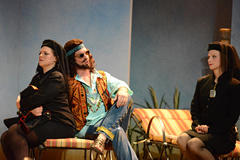| Opera Reviews | 24 April 2024 |
A Così fan tutte that is believableby Steve Cohen |
|
| Mozart: Così fan tutte Academy of Vocal Arts, Philadelphia November 2013 |
|
|
Don Giovanni and The Marriage of Figaro undoubtedly are theatrical classics, but their third work, Così fan tutte, is problematic. Its story has struck many viewers as preposterous and the characters as unrealistic. The plot, you will recall, is about an older man telling two soldiers that their fiancées won't be faithful to them. He says a woman's constancy is like the phoenix-everyone talks about it but no one has ever seen it. The soldiers accept a bet and put on disguises, woo each other's fiancées (who happen to be sisters) and seduce them. The title literally means "Thus do all [women]" and is sometimes translated as "Women are like that." That is a sad commentary on the attitudes of European men during the period of so-called Enlightenment. How could the girls not know their own lovers? Some productions have portrayed the girls as adolescents, hence immature and fickle, yet that still didn't answer the question about not recognizing their own fiancées. Director Nic Muni set this production in the 1960s. Turns out that he solved the problem convincingly, and finally we have a Così that's believable. The soldiers and their fiancées seem like many young people in the 60s, smoking pot and tripping on acid. In Da Ponte's 1790 libretto the boys pretend to sail off to battle and return disguised as mustachioed Albanians. In Muni's translation they say they have to ship out to Vietnam, then return in hippie regalia, with full beards. A hookah pipe and a potted marijuana plant are on the stage and when the girls get stoned they can't recognize their own lovers. (The Muni text was projected above the stage, while the singing was in the traditional Italian.) The newcomers party with the girls to the point where they can't see anything accurately. What's more, the drugs cause the girls to relax their inhibitions and indulge in their fantasies of sexual experimentation. In Muni's concept the boys are ROTC (training company) officers in the U.S. Marines and the ladies are young, wealthy socialites. Alfonso, who organizes the ruse, is a military officer who served in Vietnam. It raises the provocative question: What could he have experienced in his career to make him so cynical? Mozart and Da Ponte called attention to inequalities between the titled and the ordinary people. In this production the class system was economic. The young couples are privileged folk who attended Harvard and Vassar and summered on Martha's Vineyard. Despina is their oppressed domestic who asks, "Why should they get the taste and I only the smell?" Another novelty in this production was the casting of first-year AVA artists in all of the roles. We should keep in mind that the school has a rigorous audition process, and every singer who is admitted already has a college or music school degree and extensive experience. All of the six principals looked attractive and sounded fine. Soprano Melinda Whittington was a fiery Fiordiligi, singing the opera's most challenging arias, a powerful "Come scoglio" (Strongly founded) when she resisted temptation and a touching "Per pieta" (For mercy) after she succumbed. Mezzo Julia Dawson was adorable as Dorabella, Jonas Hacker and Michael Adams were stalwart as the soldiers Ferrando and Gugielmo, Daniel Noyola commanding as Alfonso, Anush Avetisyan tempting as Despina. Christofer Macatsoris conducted the orchestra magnificently, with lilt and pensiveness and anger where each were called for. No matter what one's opinion of the story, everyone must agree that the music is Mozart at the top of his game. |
|
| Text ©
Steve Cohen Photo © Paul Sirochman |

 The
three collaborations of Wolfgang Mozart and Lorenzo Da Ponte are regarded
as masterpieces.
The
three collaborations of Wolfgang Mozart and Lorenzo Da Ponte are regarded
as masterpieces. 





